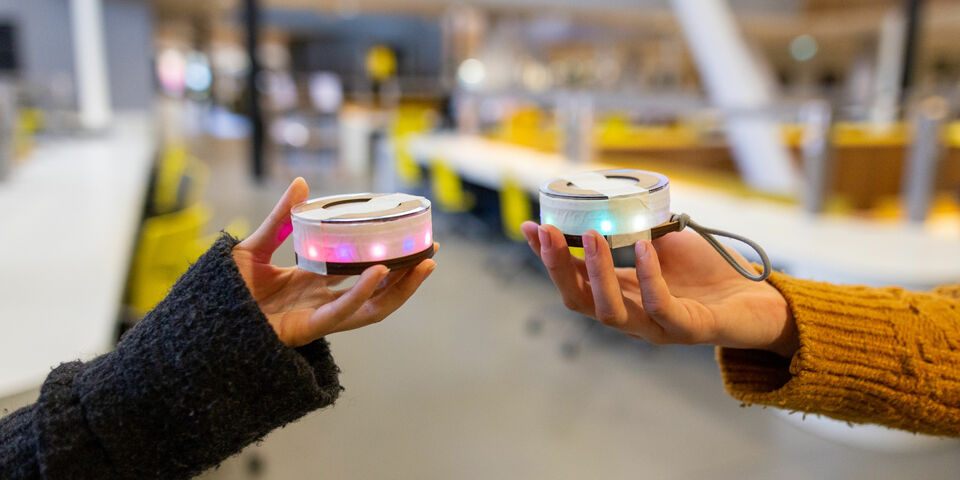Improving wellbeing interactively
An Industrial Design student has designed twin devices with the aim of bringing people together, specifically introverted students. The Community App is intended to give a clear idea of upcoming TU/e activities, and to bring together people with a shared interest. Last week Groep-één|ESR held the first in a series of campus-wide meetings focused on improving student wellbeing. Financial support is available to TU/e employees and students with a wellbeing improvement idea of their own.
While Yuan Wang has plenty of contact with other Chinese TU/e students, she also feels she isn't fully integrated and looking around, she sees that she isn't alone in this. It's is a challenge, especially for introverted students, she says, speaking from experience. In her own words:“As a Chinese student and an introvert myself, I really experience a feeling of loneliness and less integration on campus, and I feel this feeling might be common among many international students.”According to Wang, many activities are organized on campus, “but if you tend to be a little introverted, it is quite nerve-wracking to go along on your own.”
With its aim of fostering integration, her graduation project at Industrial Design may hold a solution. Before her lies the prototype: two round discs that can emit light and vibrate. They are connected. If you move one, the lamps on the other light up; press the button on one, and the other one vibrates.
She is currently doing some small-scale testing that will enable her to collect feedback on the interactions. At a later date, she will be handing out the devices to two students who don't know each other. Neither of them will know that the other has the device. “I hope they will each feel a connection with ‘the stranger’, and will start interacting via the discs, will become curious about each other and will feel a connection with the other’s cultural community as it is revealed to them through their mysterious buddy.
Having built this feeling of connection, if both feel comfortable with the idea, they can meet up and take this primary connection forward, even possibly developing friendship.
Student wellbeing
Last Tuesday, student faction Groep-één|ESR held the kick-off of its student wellbeing drive. This was attended by students and employees from various associations and TU/e services ranging from ESSF (the sports federation) and FSE (the federation of study associations) to Studium Generale and Education and Student Affairs. The student faction is keen to tackle ‘student wellbeing’ campus-wide and get everyone marching to the same tune.
This first meeting was mainly a chance for people to get to know each other better and to further clarify aims. The group wants to bring everyone together once a month, produce a vision and settle on some concrete action. Added to which, this week Wednesday Groep-één|ESR and TINT will be holding a discussion evening on this subject.
Community-app
At the first meeting, Lara Hofstra, a member of staff at the Student Sports Centre, and alumni Maximilian Messmer and Daan van Vugt presented their proposal for the Community App. The app is intended to offer an interactive calendar providing a clear overview of activities occurring at and related to TU/e. In addition, the app will become a platform where campus residents with similar interests can meet one another. The team behind the app is making every effort to find the budget to realize their idea.
Mock-up of the community-app. Illustration | Maximilian Messmer
Got an idea of your own?
If you have an idea of your own for fostering diversity at TU/e and creating a closer community, you can apply to the TU/e Diversity Fund for financial support. You have until November 30th to submit your idea and the five best applicants will receive up to five thousand euros to implement their idea.
In explaining the initiative, community manager Erik de Jong says, “We ourselves are bursting with ideas, but we want to encourage the TU/e community to come up with ideas of their own.”
The applicants must adhere to various criteria: for example, the idea must be in line with Strategy 2030, must cost no more than five thousand euros, and be innovative. In other words, the funding may not be spent on existing activities. Above all, a broad group at TU/e should benefit, not just a particular department or TU/e service. The other criteria are posted online.
The people who come up with the winning ideas will be allowed to carry out their projects themselves, and should do so within the current academic year. “We can, of course, put the winners in touch with the right people,” says De Jong.






Discussion